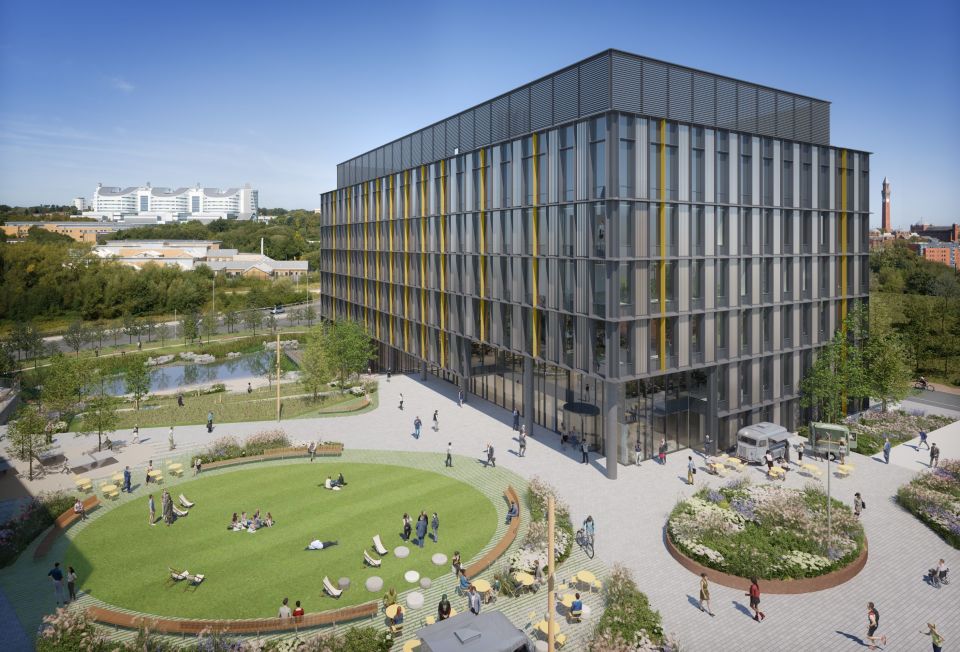Birmingham Health Innovation Campus takes another step forward after planning permission granted
By Bruntwood SciTech

Work is set to begin on the first phase of Birmingham Health Innovation Campus this Summer after planning permission was granted by Birmingham City Council.
The first phase will see the development of No.1 Birmingham Health Innovation Campus which will offer 133,000 sq ft of lab and office space purposely designed for health innovation and life sciences businesses, with a focus on those working in medtech, precision medicine, biopharma and digital healthcare.
The building will include the home of the University of Birmingham’s Precision Health Technologies Accelerator (PHTA), providing innovation and incubation spaces for businesses to engage with academics and clinicians, bringing together capabilities in diagnostics, data, clinical trials and medical technologies.
The Campus positions the West Midlands to capitalise on the UK’s emerging healthtech sector, which attracted £1.12bn in investment in 2020, according to the latest report by Tech Nation, and has already been designated a Life Science Opportunity Zone by the Department for Business, Energy and Industrial Strategy (BEIS). It has also been identified as part of the High Potential Opportunity for Data Driven Healthcare by the Department for International Trade (DIT).
Companies located at Birmingham Health Innovation Campus will benefit from high quality lab space and office space, and access to a fully connected clinical trials translation ecosystem at the region’s NHS Trusts. The Campus will also offer a range of additional facilities including a cafe, indoor and outdoor event space, meeting rooms, cycle storage and car parking.
The 10-year masterplan will provide up to 657,000 sq ft of state-of-the-art space for the West Midlands’ life sciences sector, supporting the creation of over 10,000 new jobs and contributing £400m of GVA to the regional economy by 2030.
No.1 Birmingham Health Innovation Campus is being developed in accordance with Bruntwood SciTech’s ongoing commitments to sustainability. Targeting BREEAM ‘Excellent’, the building will incorporate a number of design measures to reduce carbon emissions, mitigate the effects of climate change and protect and enhance the local environment.
David Hardman, managing director, Bruntwood SciTech - Birmingham, said: “The response since announcing the development of Birmingham Health Innovation Campus, in partnership with the University of Birmingham, has been extremely positive. It’s clear that this is being seen as a real milestone in the evolution of the West Midlands as a health innovation and connected healthcare technologies powerhouse.
“The region has all the raw ingredients the sector needs - world-class universities, a number of specialist NHS Trusts, quality infrastructure and a growing cluster of SMEs - to support the journey from early R&D to manufacture and market adoption of new health products and services. The Campus will be the epicentre where all these come together and attract further inward investment to ensure the West Midlands has one of the country’s most exciting life sciences propositions for years to come.”
Professor Tim Jones, University of Birmingham Provost and Vice-Principal, commented: “With the UK beginning a cautious easing of Covid-19 restrictions, this announcement could not be more timely. The speed at which the University and our NHS partners were able to mobilise against the pandemic is indicative of our collaborative and innovative approach to life sciences and medical technologies – an approach which businesses working with us at Birmingham Health Innovation Campus will benefit greatly from.
“The development is set to play a major role in post-Covid economic recovery, bringing enhanced health, wealth and opportunity to the city and wider West Midlands on a scale rarely witnessed. We are greatly appreciative of the support the Campus has received from the City Council and look forward to progressing with construction.”
Birmingham Health Innovation Campus is being built in Selly Oak, in the heart of the University of Birmingham’s academic and clinical cluster with the first phase set to complete in 2023.
The development has received funding from Birmingham City Council to support enabling the site. The Precision Health Technologies Accelerator (PHTA) has received £11m from the Greater Birmingham and Solihull Local Enterprise Partnership (GBSLEP) through the Local Fund and the Government’s Getting Building Fund.
Chair of Greater Birmingham and Solihull Local Enterprise Partnership (GBSLEP), Tim Pile added: “GBSLEP views health and medical technologies as a driver for inclusive economic growth. Our investment of over £11 million into the PHTA reflects our commitment to ensure we create opportunities for businesses to collaborate with industry experts and scale up.
“Healthcare innovation has been under the spotlight over the last 12 months and Birmingham Health Innovation Campus will undoubtedly help address the health needs that have emerged throughout Covid-19. The PHTA, which we have funded, highlights the way in which GBSLEP works in partnership with universities, businesses and local authorities to target investments in sectors and projects that will elevate our region, create jobs and put us on the global stage as a leader in innovative health and medical technologies. I look forward to the work commencing on site this summer.”
Stay Connected!
Sign up to our newsletter for the latest news, updates and offers.